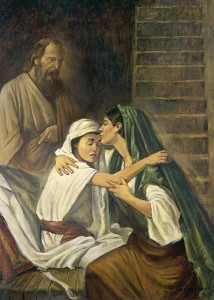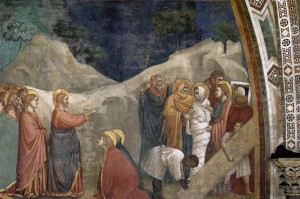When times are hard, it helps to read about other people who endured trials and survived. The Bible is filled with imperfect people who struggled through a wide range of trials with faith, although it sometimes took a while for them to remember to have faith. Reading these stories during your own trials can bring comfort and guidance for getting through your worst—or even just everyday—trials.
Esther: Comfort While Standing for Truth
The story of Esther is a controversial one, in that some Biblical scholars are not sure it is true and because it seems to promote a political message that doesn’t easily mesh with the religious message of the Bible. Whether or not it is true, the story is one that has helped many people throughout the ages found courage and comfort in difficult times. Often our need for comfort results from the wickedness of the world. As Christians, we are called on to stand for truth and righteousness, no matter how unpopular it makes us or what the risks are. This can be very scary, especially for people who aren’t by nature the type to take risks.
The story begins before Esther enters it. The king was married to a woman named Vashti, who was very beautiful. The king wanted her to show off that beauty to his guests, who were drunk and therefore could be counted on to be disrespectful in an inappropriate way, and she refused to come when the king beckoned her.. The king was furious, but she held her ground and was removed as queen. She may have been killed.
Esther, a Jewish woman, was initially the opposite of Vashti—shy, quiet, and obedient. She became the king’s favorite after winning a sort of beauty contest with the prize the opportunity to take Vashti’s place. She was, like Vashti, very beautiful. No one at court knew Esther was Jewish.
Her cousin, Mordecai, who had raised her, discovered that Haman planned to kill all the Jews and that Haman had lied to the king to convince him to agree. The Jewish people began a fast and stood in sackcloth and ashes outside the palace gates. This was illega,l and Esther was worried about Mordecai’s safety.
Mordecai wanted Esther to go to the king to plead for the Jews. She knew that approaching the king without an invitation could lead to her death, but Mordecai pointed out that as a Jew, she would be killed anyway if the decree went through. He suggested that perhaps God had placed her in this situation for just such a time as this.
She asked him to have the Jews fast for three days and she and her servants would do the same. She said she would then approach the king, and if she perished, she perished.
Things worked out well for Esther. The king did not kill her and Haman was executed for treason. The order could not be overthrown, but the Jews were permitted to defend themselves. This event is the basis of the Jewish celebration of Purim.
Today, most of us aren’t asked to stand up for what is right at the risk of our lives, but we do face situations all around us that require us to show moral courage. If all the people who know God’s teachings on a subject stay silent, those who stand in opposition to truth will win.
“As we go about living from day to day, it is almost inevitable that our faith will be challenged. We may at times find ourselves surrounded by others and yet standing in the minority or even standing alone concerning what is acceptable and what is not. Do we have the moral courage to stand firm for our beliefs, even if by so doing we must stand alone? … It is essential that we are able to face—with courage—whatever challenges come our way” (Thomas S. Monson, “Dare to Stand Alone,” Ensign or Liahona, Nov. 2011, 60).
On these exhausting and challenging days, it helps to quote Esther: “If I perish, I perish.” We may not always win our battle, as Esther did, but as she realized, if she died in the attempt, she died fighting for moral causes and on the right side of God.
The Widow of Zarephath: Comfort during Leaps of Faith
The widow of Zarephath does not even have a name in the Bible. She was not, in her own time, considered important. Despite this, God was aware of her needs and sent someone to meet them in a most unusual way. All that was asked of her was that she have faith—a greater level of faith than many of us would be able to have.
The widow was suffering from the ongoing drought that left many hungry. The prophet Elijah was in hiding when God told him to go to a specific widow to request food and lodging. She was a Gentile, not a Jew. He found her at the entrance to the town, where she was gathering sticks in preparation for making what she expected to be her last meal for herself and her son. When it was eaten there would be no further food and they would simply wait to die.
Elijah asked her for water. Even though there was a terrible drought and water was hard to come by, she willingly brought him some. Then he asked for bread. She explained that she had only a little meal and oil. He instructed her to make him a small cake (similar to pita bread) first and then to make a meal for herself and her son. He asked her to do this without fear and to trust his promise that God—a God who was not her God–would see to it she had meal and oil until the rains came again.
Most women would have been too afraid to make this sort of sacrifice, particularly if they had a hungry child. This woman was not even a Jew, and so she might reasonably not have viewed Elijah as a prophet. Amazingly, she trusted Elijah’s promise and Elijah’s God. She continued to have enough food during the years the prophet lived in her home.
There are many comforting lessons to pull from the widow’s experiences. One is that God pays attention to our needs even when we aren’t seemingly important. After all, we don’t even know this woman’s name, and yet Jesus Christ Himself knew who she was and referred to her in his sermons. As poor as she was, she mattered to God, who doesn’t look at our wealth or social status, ethnicity or culture. He knows her name, even if we don’t.
I find this story helpful when I’m scared. The woman had to make cake for Elijah before she made them for her and her son. Only when she’d made his meal did she discover there was enough for her to feed her child. When things are hard, I find myself wanting God to fix things before I demonstrate that I trust Him, and the widow helps me remember to trust God’s promptings. I can’t always wait for God to make the first move. Sometimes I just have to take that leap of faith after I receive instructions from God.
Jonah: When you’ve Done Something Wrong
The Bible features many stories about people who have made mistakes. The message that comes from them is that we can repent and God will forgive us for our sins.
Jonah was a prophet who was called to preach repentance to Nineveh. Sometimes we presume that someone special enough to be called as a prophet is practically perfect and always brave. Jonah shows us that prophets are just ordinary people called to do extraordinary things. All of us are also ordinary people. It is how we respond to God’s calls that makes us extraordinary. Jonah, an ordinary man called to be a prophet, had one flaw—and who doesn’t have at least one?
Jonah appears to have been mad at God. Israelites in his day had been taught that the Jews were the chosen people and the Gentiles were bad. This was deeply ingrained in them so that they forgot that individual Gentiles might be good or that God actually loves the Gentiles, too. The Assyrians, in the minds of Jonah’s people, were especially evil and war-like, and the two groups considered themselves deep enemies.
Jonah was upset that God wanted him to go to preach to these enemies of his—not because he was scared, but because he didn’t want to give them a chance to repent and be saved. If they did that, they might not be destroyed, and Jonah wanted them destroyed. So, instead of heading for Nineveh, he hopped a boat to Tarshish. He imagined he could go another direction and hide from God. His prejudices were getting in the way of his humanity and love for all of God’s children. This is a serious fault for a prophet.
Of course, it is impossible to hide from God, so God created a storm that put the boat in great danger. Jonah was asleep and missed much of the early drama. The sailors began throwing things overboard in hopes of lightening the ship to save it. When that didn’t seem to be enough, the captain awakened Jonah and said that he should call on his God to help them know whose fault the storm was. They cast lots and the results pointed to Jonah as the culprit.
He told them to throw him overboard and the ship would be saved. To their credit, they didn’t want to do that, so they tried to row to shore first. Finally, they realized they would have to throw him overboard.
I’m sure Jonah thought, at that point, that he would pay for his hatred and rebellion with his life. To his surprise, God had prepared a way to save him. He sent along a big fish to swallow Jonah. When the fish showed up, Jonah was probably not feeling comforted. After all, being swallowed by a big fish doesn’t feel like a rescue. God managed to have the fish swallow Jonah without hurting him. He stayed there for three days—probably the most unpleasant three days of his life. This story is considered a type of Christ’s stay in the tomb for three days. Jonah spent his three days praying and repenting. He promised God he would do the right thing if he ever got out of there. When the three days ended, the fish decided he wasn’t interested in Jonah and spit him out. Although some people have suggested this story can’t be true, Jesus Christ believed it was, and so it is true.
Lots of people, when they’re in trouble, make promises to God, but few actually keep them. Jonah did. He went to Nineveh and preached repentance. Possibly to his surprise, the people believed him and repented.
It’s important to note that Jonah didn’t become perfect after this event. When the people repented, he didn’t celebrate—he got upset. He hadn’t really wanted them to repent, especially when God chose not to carry out the punishments for them He had promised. Now that they had repented, God accepted them. Jonah scolded God and suggested God just kill Jonah if that’s how things were going to be.
God went to work helping Jonah repent yet again. Jonah went outside the city to wait to see what would happen to his enemies. God sent a gourd to shade Jonah, which the prophet appreciated. But the next morning, God arranged for a worm to kill the gourd. Next, God sent a fierce desert wind and blazing heat. This time Jonah wanted to die because he was so uncomfortable. God helped him to understand that Jonah was upset his protective gourd had died, but he had done nothing to bring the gourd about. He had, however, helped the people of Nineveh to repent and he needed to celebrate the salvation of God’s children that God had brought about through Jonah’s preaching.
The lessons of Jonah are many. We can’t run away from God and trying to avoid His commands is never a good idea. However, another lesson the story teaches us is that we can repent and be forgiven. God forgave the people of Nineveh for their deep sins and showed mercy on them. He did the same for Jonah. No matter who we are, God wants us to repent and come back to him. He sends people to help make that possible. The people He sends may not be perfect, but they can show us the way back home to God.
The people of Nineveh were very wicked and yet God worked hard to give them an opportunity to be saved. Once the people of Nineveh repented, God forgot their sins and changed the plan for their futures. We can presume, from His loving efforts to train Jonah, that He did the same for the prophet.
If our hearts are aching because we feel we’ve been too wicked, the story of Jonah can help us repent and change our lives. We can trust God to help us through the process and to lead us to people who can help if we need it.
Lazarus: When You Feel Helpless
Lazarus and his sisters, Mary and Martha, were close friends with the Savior. The story of how the Savior brought Lazarus back from the dead brings us comfort when we feel helpless. We can’t presume God will save every person from death, but the story does assure us that God is greater than any earthly power and has a plan for life and for the world. Sometimes our trials serve a greater good if we trust God.
Jesus was away when Lazarus became sick. A message was sent to Jesus, asking Him to return home to save him, but Jesus chose to delay his return for two days. He explained that Lazarus’ death had a purpose, that of glorifying God. When He was ready to leave, his followers warned Him that returning would be too dangerous, but Jesus was not concerned. When he neared the home of His friends, Mary and Martha were upset that Jesus had taken so long. Martha ran to meet Jesus, who was still approaching, and told him her brother had already been dead for four days and that if Jesus had been there, this wouldn’t have happened. Despite this, she said that she knew that whatever Jesus asked of God, He would receive. She had a powerful faith in her Savior. Jesus assured her that her brother would live again. She thought He referred to the promised resurrection, which she testified that she believed in. She went to tell her sister that Jesus was coming and that He wanted to talk to her.
Mary ran to meet him. She was so overwhelmed with grief over her brother’s death she fell at his feet, crying, and also asserted her belief that if Jesus had been there, Lazarus would still be alive. Jesus’ heart broke at the depth of her grief. He asked where Lazarus was and was told they’d take Him there. Jesus, deeply moved by the grief of His friends, also wept.
When they reached the grave, He instructed the people to remove the stone. Mary protested, saying that by now the body would stink. He reminded her that He had personally taught her that if she believed, she would see the glory of God.
The stone was removed. Jesus offered a prayer of thanks to God and then commanded Lazarus to rise. He did.
Jesus said that all this was done to help the people come to a testimony of God and of Jesus Christ. Mary, Martha, and others who loved Lazarus suffered greatly during this time, but Jesus, however much He loved them, had to allow it. Because He did, centuries of Christians have learned essential lessons about the Savior.
When we have trials, we want God to remove them immediately, or even to prevent them. However, it is often through our trials that we learn and grow. Often, others also benefit from the lessons of our trials. If we face them with faith, letting God take charge, our lives will be richer with meaning.
The Atonement of Jesus Christ: When we’re Feeling Unloved
Jesus spent three years teaching the gospel and helping followers move to the next step of religious faith. However, He came for the events that happened at the very end of His ministry: the atonement.
Jesus Christ went into the Garden of Gethsemane shortly before His arrest. He was there to begin atoning for the sins of the world, something He had promised to do before the world was created. This was entirely voluntary on His part, but it was also essential. As the only one who could carry it out, had He chosen not to be the Savior, there would have been no hope for mankind. We could not have repented, risen from the dead, or have been saved.
 The Savior took a few of His apostles with Him and asked them to stand watch while He went further into the Garden. The pain of the atonement process, which involved suffering for each individual person’s sins, was very painful, and He bled from every pore. When He stopped briefly, He returned to His apostles and found they were sleeping while He was suffering for them. He returned to continue the process, but again found them sleeping when He returned. They did not understand what He was doing, and while He was sad, He forgave them.
The Savior took a few of His apostles with Him and asked them to stand watch while He went further into the Garden. The pain of the atonement process, which involved suffering for each individual person’s sins, was very painful, and He bled from every pore. When He stopped briefly, He returned to His apostles and found they were sleeping while He was suffering for them. He returned to continue the process, but again found them sleeping when He returned. They did not understand what He was doing, and while He was sad, He forgave them.
When Jesus Christ was arrested, He endured a great deal of abuse, but He withstood it for the greater good. He was placed on the cross to be painfully killed, and while He could have prevented it, He did not. He allowed Himself to die. Three days later, He rose from the dead and this broke the bonds of death for all of us.
Through the atonement of Jesus Christ, we are able to live forever and to repent of our sins. We can be fully forgiven if we repent, because Jesus Christ paid the penalty we could not. If we demonstrate that our admission of faith has real substance by trying to become like Christ, we can live with God forever.
The atonement of Jesus Christ can be one of the hardest parts of scripture to read for those who love the Savior and hate to think of Him suffering. At the same time, it is an extraordinary testimony of the love both God and Jesus Christ have for us.
Parents know how much they long to keep their children from suffering. God loves Jesus even more than we love our own children, and yet He had to withdraw and leave Jesus to suffer through the atonement. He did this because He also loves us enough to suffer on our behalf. He sent His Son, which I believe is harder than sending yourself, knowing how hard His life was going to be.
Jesus Christ had the ability to come here and live an easy and perfect life, but He chose not to do so. He came, but He came as our Savior. He had no sins of His own and yet He paid the price for ours instead of simply living a life without negative consequences. He loves us that much.
The atonement reminds me every day that I am deeply loved and never alone. The Savior endured pain, suffering, and loneliness so that I could have a perfect eternity if I chose to do so. He reminds me that life, with all its trials, exists as a gift of love.
Discuss: What is your favorite Bible story when you need comfort? How does it comfort you? Leave a message below to share it with us.




